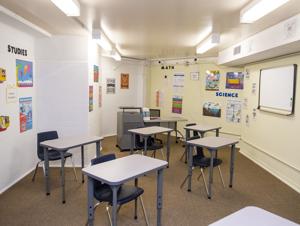
Several civil rights groups asked the U.S. Department of Education this week to investigate whether youths incarcerated at the new juvenile lockup at Angola are receiving adequate educational opportunities.
Last year, amid worsening problems at a Jefferson Parish youth prison, Louisiana Gov. John Bel Edwards announced a decision to house teens labeled particularly problematic in a building within the gates of Louisiana State Penitentiary that once held inmates on death row.
In a letter released this week, several civil rights groups called the state’s move “entirely inconsistent with decades of juvenile justice and public safety best practices, years of investment in juvenile justice reform efforts, and our growing understanding of childhood development and safety.”
Advocates and attorneys with the Southern Poverty Law Center, national and state ACLU, Family and Friends of Louisiana’s Incarcerated Children and the Louisiana Center for Children’s Rights, among others, signed the document.
An Office of Juvenile Justice spokesperson did not immediately return a request for comment.
In their letter, the organizations call for a federal investigation of the impact on general and special education rights for the teens housed at Angola. They also requested a broader investigation into education at the state’s other juvenile secure care facilities.
“There is growing evidence that these children are not receiving the required educational services,” the letter says. “Black children and their families are the most affected by these systemic failures and this reflects the alarming disparities within the juvenile justice system and the educational system.”
The letter argues that the Angola facility is not “equipped to provide the necessary education to children,” and that OJJ has struggled with staffing shortages at other state facilities.
The advocates also allege that many entering OJJ custody already suffer from educational disadvantages and are more likely to have learning or behavioral disabilities. They fear the youth incarcerated at Angola are “suffering serious academic regression,” the letter says.
“Angola Penitentiary and OJJ’s lack of infrastructure for youth education, and the severe staffing shortages in both agencies, are creating severe educational neglect and deprivation for the children in Angola Penitentiary,” they wrote. “Louisiana is legally obligated to provide consistent general and special education under federal law when incarcerating children.”
Even before the first transfers to Angola, one federal official weighed in, asking the state to look for other solutions. And in court hearings last year, a former Washington, D.C. youth corrections official told a federal judge he feared the former death row building lacked necessary equipment and facilities to provide the teens education and medical care.
In the letter, the groups reference two teens previously housed at Angola who sought to join an ongoing lawsuit filed last year against the governor and OJJ. In court filings, the teens described significant gaps in their education, including failure to implement an individualized education plan for one of the youths.
The civil rights groups also cited reports suggesting an initial plan to educate youth at the adult prison was simply a repurposed manual from the Acadiana Center for Youth at St. Martinville, a much-maligned facility for youths whom agency officials deemed incapable or unwilling to stop acting aggressively.
That facility came under scrutiny last spring, when news reports surfaced describing teens living in horrific conditions, often with disrupted, delayed or insufficient education access.
The civil rights groups also questioned the ability of all OJJ secure care facilities to provide the education standards required by law, saying those schools “are in a moment of crisis.”
“These schools are understaffed, rank at the very bottom of all schools in the state on school performance metrics, and are failing to provide students with the credits they need to enroll in schools in their communities upon release,” the letter says.


Leave a Reply